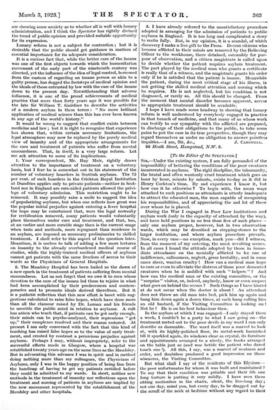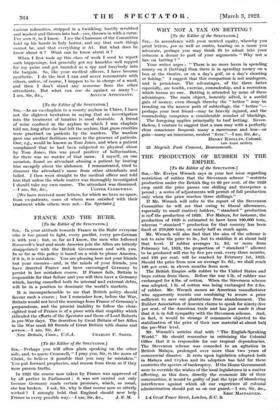[To the Editor of the SPECTATOR.] Sm,—Under the existing system,
I am fully persuaded of the impossibility of bettering the conditions of the poor creatures incarcerated in asylums. The rigid discipline, the inhumanity, the brutal and often wantonly cruel treatment which goes on hour by hour, minute by minute, exists to-day as it did in Henry Cockton's time. By sad experience I know it, but how can it be otherwise ? To begin with, the mean wage attached to such positions as attendants is utterly inadequate to attract the educated man, the man capable of recognizing his responsibilities, and of appreciating the sad lot of those over whom he is placed.
During the War. I engaged in Poor Law institutions and asylum work (only in the capacity of attendant by the way), and have held positions in no less than five of such places— only one asylum proper, however, but in two observation wards, which may be described as stepping-stones to the larger institution, and where asylum procedure prevails. Now, in every case—no exception, mark you—did I witness, from the moment of my entering, the most revolting scenes. In all cases I found the attitude adopted by those in imme- diate attendance on the mentally afflicted to be one of indifference, callousness, neglect, gross brutality, and in some cases sheer, wanton cruelty 1 How can a medical man hope to cure or even to alleviate the distress of those poor demented creatures when he is saddled with such " helpers " ? And how can the medical man or the existing committee, or the "surprise" visitor, or, indeed, anybody, know or even suspect what goes on behind the scenes ? Such things as I have hinted at do not occur when the doctor is about I An attendant does not throw an old man into bed, pick him up again and bang him down again a dozen times, at each bang calling him an old bastard, if the Visiting Committee is looking on I Not he He is on his best behaviour then.
In the asylum at which I was engaged—I only stayed there a week, I couldn't be a party to what I saw going on—the treatment meted out to the poor devils in my ward I can only describe as damnable. The ward itself was a marvel to look at, with its highly-polished floor, its metal-work burnished till it sparkled again, its windows clear as crystal, its furniture and appointments arranged to a nicety, the books arranged on the table just so (and woe betide the patient who dared touch one 1). All this, I say, was a marvel of neatness and order, and doubtless produced a good impression on those wiseacres, the Visiting Committee.
But what shall I say of the residents of this Elysium— the poor unfortunates for whom it was built and maintained ? To say that their condition was pitiable and their life one long torture is putting it very mildly. I have seen them sitting motionless in the chairs, silent, the live-long day ; not one day, mind you, but every day, to be dragged out by the scruff of the neck at bedtime without any regard to their
various infirmities, stripped in a twinkling, hastily scrubbed and washed and thrown into bed—yes, thrown in with a curse. I've seen it, so I know. I see the Chairman of the Committee hold up his handS in holy horror, and say that such thin& cannot be, and that everything is AL But what does he know about it ? What can he know about it ?
When I first took up this class of work I used to report such happenings, but generally got my knuckles well rapped for my pains and got branded as a spy and busybody into the bargain. So, like your medical officers, I have become apathetic. I do the best I can and never remonstrate with others, unless, of course, I happen to be in charge of a ward, and then I don't stand any nonsense from the other attendants. But what can one do against so many ?-











































 Previous page
Previous page